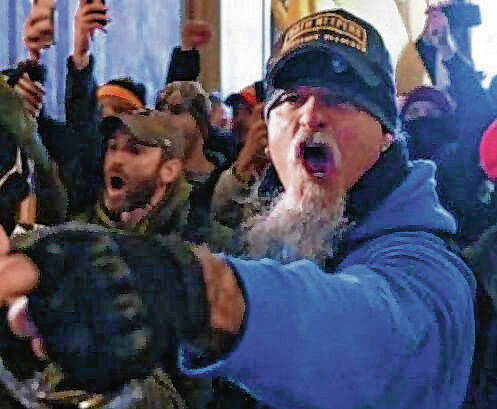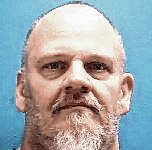
File photo Jon Schaffer is facing six federal crimes for his alleged involvement in the Jan. 6 U.S. Capitol insurrection.
WASHINGTON — The Supreme Court on Tuesday questioned whether federal prosecutors went too far in bringing obstruction charges against hundreds of people who stormed the U.S. Capitol on Jan. 6, 2021 — including a former Columbus resident.
However, it wasn’t clear how the justices would rule in the case, which could affect the prosecution of former Columbus resident and former heavy metal musician Jon Schaffer, who pleaded guilty to the same charge over his role in the Jan. 6 attack.
The high court’s eventual ruling also could have implications for former President Donald Trump, who faces the same obstruction charge for his efforts to overturn his election loss in 2020.
The justices heard arguments over the charge of obstruction of an official proceeding in the case of Joseph Fischer, a former Pennsylvania police officer who has been indicted for his role in disrupting Congress’ certification of Joe Biden’s 2020 presidential election victory over Trump, The Associated Press reported.
Fischer is one of 330 people — including Schaffer — facing that charge, which stems from a law passed in the aftermath of the Enron financial scandal more than two decades ago to deal with the destruction of documents.
It is one of two charges that Schaffer pleaded guilty to. He also pleaded guilty to one count of entering and remaining in a restricted building or ground with a deadly or dangerous weapon.
Schaffer, who is best known as a former member of the heavy metal band Iced Earth, is currently awaiting sentencing on Aug. 2.
After more than 90 minutes of arguments on Tuesday, it was not clear precisely where the court would land in Fischer’s case, according to wire reports. Conservative justices Samuel Alito and Neil Gorsuch appeared most likely to side with Fischer, while liberal Justices Elena Kagan and Sonia Sotomayor seemed more favorable to the Justice Department’s position.
Justices Amy Coney Barrett and Ketanji Brown Jackson, a former federal public defender, expressed interest in more of a middle-ground outcome that might make it harder, but not impossible, for prosecutors to use the obstruction charge.
Some of the conservative justices said the law was so broad that it could be used against even peaceful protests and also questioned why the Justice Department has not brought charges under the provision in other violent protests.
“There have been many violent protests that have interfered with proceedings,” Justice Clarence Thomas said. He was back on the bench Tuesday after an unexplained one-day absence.
Gorsuch appeared to be drawing on actual events when he asked Solicitor General Elizabeth Prelogar whether people could be charged with obstructing an official proceeding if they rose in protest inside the courtroom, heckled the president at the State of the Union or pulled a fire alarm in the Capitol complex to delay a vote in Congress, according to wire reports.
Alito, suggesting the government’s reading of the law is too broad, asked whether the charge could be applied to people who disrupted the day’s court session by shouting “Keep the January 6 insurrectionists in jail or “Free the January 6 patriots.”
He hastened to add, “What happened on Jan. 6 was very, very serious and I’m not equating this with that.”
The high court case focuses on whether the anti-obstruction provision of a law that was enacted in 2002 in response to the financial scandal that brought down Enron Corp. can be used against Jan. 6 defendants, according to wire reports.
Lawyers for Fischer, the former North Cornwall Township police officer, argue that the provision was meant to close a loophole in criminal law and discourage the destruction of records in response to an investigation. Until the Capitol riot, lawyer Jeffrey Green told the court on Fischer’s behalf, the provision “had never been used to prosecute anything other than evidence tampering.”
Fischer “was not part of the mob” that forced lawmakers to flee the House and Senate chambers, Green wrote in court papers, noting that he entered the Capitol after Congress had recessed. The weight of the crowd pushed Fischer into a line of police inside, Green wrote.
But Prelogar, the administration’s top Supreme Court lawyer, said the other side is reading the law too narrowly, arguing it serves as a “classic catchall” designed to deal with the obstruction of an official proceeding. She said Fischer’s actions before, during and after Jan. 6 demonstrated that he intended to keep Congress from doing its job of certifying the election results.
In Schaffer’s case, his attorneys have argued that the Supreme Court’s decision in the Fischer case “directly relates to and impacts the validity” of Schaffer’s plea and conviction and could factor into what his ultimate sentence would be.
“If Mr. Schaffer is sentenced to a term of incarceration (for the obstruction charge) … and begins serving his sentence, he will be irreparably harmed as he would lose his gainful employment, uproot his life and serve time for a felony that may be invalidated by the Fischer outcome,” one of Schaffer’s attorneys said in court filings.
Federal authorities justified the obstruction charge against Schaffer by alleging that he “attempted to, and did, corruptly obstruct, influence and impede an official proceeding; that is, Schaffer forcibly entered the Capitol to, and did, stop, delay and hinder Congress’ certification of the Electoral College vote,” according to court records.
“Schaffer … positioned himself at the front of a large mob that broke open the Capitol building doors being guarded by four Capitol police officers wearing riot gear,” according to court filings. “Schaffer was among the first six individuals to push past the damaged doors and into the building, forcing officers to retreat. As the mob swelled inside, and officers were being assaulted, Schaffer and other members of the mob continued to advance while aggressively gesturing toward a row of five to six backpedaling officers trying to maintain a security line in front of them.”
Schaffer was photographed inside the Capitol wearing a tactical vest and hat that said, “Oath Keepers Lifetime Member,” with bear spray in his hand, according to court filings.
As part of his guilty plea, Schaffer acknowledged that he is “a founding, lifetime member of the Oath Keepers” and believes that “the federal government has been ‘co-opted’ by a cabal of elites actively trying to strip American citizens of their rights.”
The Oath Keepers is a militia group that recruits current and former military, police and first responders.
“Even if the Supreme Court were to decide Fischer adversely to the government, it is not clear that the court’s interpretation of (the obstruction charge) would necessarily invalidate Schaffer’s conviction in this case,” federal prosecutors said in court filings. “And even if it did, the appropriate venue for challenging such a sentence would be a post-sentencing appeal, and not a motion to set aside the verdict. …Moreover, obstruction of Congress was not Defendant Schaffer’s only conviction. He will also be sentenced for unlawfully entering or remaining in a restricted building or grounds with a deadly or dangerous weapon.”
The obstruction charge is among the most widely used felony charges brought in the massive federal prosecution following the violent insurrection, according to wire reports. It carries a maximum prison term of 20 years, but Prelogar said the average term imposed so far is about two years.
Roughly 170 Jan. 6 defendants have been convicted of obstructing or conspiring to obstruct the Jan. 6 joint session of Congress, including the leaders of two far-right extremist groups, the Proud Boys and Oath Keepers. A number of defendants have had their sentencings delayed until after the justices rule on the matter.
More than 1,350 people have been charged with Capitol riot-related federal crimes, according to the AP. Approximately 1,000 of them have pleaded guilty or been convicted by a jury or judge after a trial.
Two Bartholomew County residents — Donald Lee Moss of Elizabethtown and James Link Behymer of Hope — are also currently facing criminal charges over their alleged participation in the riot.
However, they are not facing the obstruction charge that is currently before the Supreme Court.
The high court is expected to issue its decision by late June.




